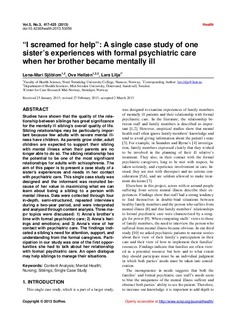| dc.description.abstract | Studies have shown that the quality of the rela- tionship between siblings has great significance for the mentally ill sibling’s overall quality of life. Sibling relationships may be particularly impor- tant because few adults with severe mental ill- ness have children. As parents grow older, adult children are expected to support their sibling with mental illness when their parents are no longer able to do so. The sibling relationship has the potential to be one of the most significant relationships for adults with schizophrenia. The aim of this paper is to present a case study of a sister’s experiences and needs in her contact with psychiatric care. This single case study was designed and the informant was recruited be- cause of her value in maximizing what we can learn about being a sibling to a person with mental illness. Data were collected through four in-depth, semi-structured, repeated interviews during a two-year period, and were interpreted and analyzed through content analysis. Three ma- jor topics were discussed: 1) Anna’s brother’s time with formal psychiatric care; 2) Anna’s feel- ings and emotions; and 3) Anna’s view of her contact with psychiatric care. The findings indi- cated a sibling’s need for attention, support, and understanding from the formal caregivers. Parti- cipation in our study was one of the first oppor- tunities she had to talk about her relationship with formal psychiatric care. An open dialogue may help siblings to manage their situations. | |
